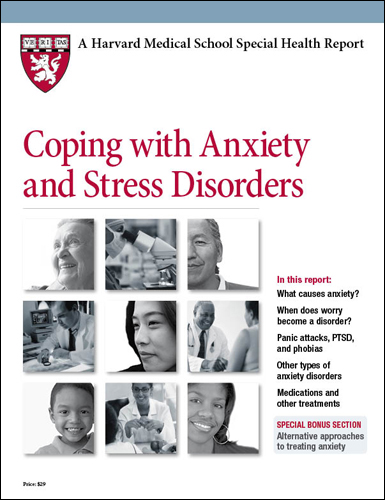Trying to be perfect can cause anxiety No one is "perfect." Yet many people struggle to be, which can trigger a cascade of anxieties. Perfectionism may be a strong suit or a stumbling block, depending on how it's channeled, as clinical psychologist Jeff Szymanski explains. Dr. Szymanski is the associate instructor of psychology at Harvard Medical School and executive director of the International OCD Foundation. "The core of all perfectionism is the intention to do something well," says Dr. Szymanski. "If you can keep your eye on intention and desired outcome, adjusting your strategy when needed, you're fine.... But when you can't tolerate making a mistake, when your strategy is to make no mistakes, that's when perfectionism starts veering off in the wrong direction." In its most severe form, perfectionism can leave you unable to complete any task for fear of making a mistake. Get your copy of Coping with Anxiety and Stress Disorders
Everyone worries or gets scared sometimes. But if you feel extremely worried or afraid much of the time, or if you repeatedly feel panicky, you may have an anxiety disorder. Anxiety disorders are among the most common mental illnesses, affecting roughly 40 million American adults each year. This report discusses the latest and most effective treatment approaches, including cognitive behavioral therapies, psychotherapy, and medications. A special section delves into alternative treatments for anxiety, such as relaxation techniques, mindfulness meditation, and biofeedback.
 | To help you prioritize the projects and activities that mean the most to you and keep your personal strategy in line, Dr. Szymanski has shared the following exercise: What do you find valuable in life? What would you want 50 years of your life to represent? If that seems overwhelming, where do you want to put your energies for the next five years? Think about your current goals and projects, and assign them priorities. Use the letters "ABCF" to help you decide where you want to excel (A), be above average (B), or be average (C), and what you can let go of (F). For example: - A (100% effort): This is reserved for what's most important to you. For example, if your career is most valuable, your goals might be to impress the boss, make sure clients are happy, put out good products at work.
- B (above average, maybe 80% effort): Perhaps you like playing golf or tennis or want to learn a new language. You enjoy these activities, but have no plans to go pro.
- C (average effort): Perhaps having a clean home is important, too. But how often does your home need to be cleaned? People aren't coming to see it every day. Could you just clean up on the weekends? Or focus on a few rooms that get the most traffic?
- F (no effort): Time-consumers that don't advance your values or bring you pleasure — for example, lining up all your hangers or folding all your clothes in a specific way. Do you have any tasks that, upon reflection, don't really matter — you've just done them one way for so long that you're on autopilot? These deserve to be pruned.
To learn more about anxiety, including the difference between what's normal and should be considered serious, as well as ways to treat anxiety, buy Coping with Anxiety and Stress Disorders, a Special Health Report from by Harvard Medical School. | 
No comments:
Post a Comment